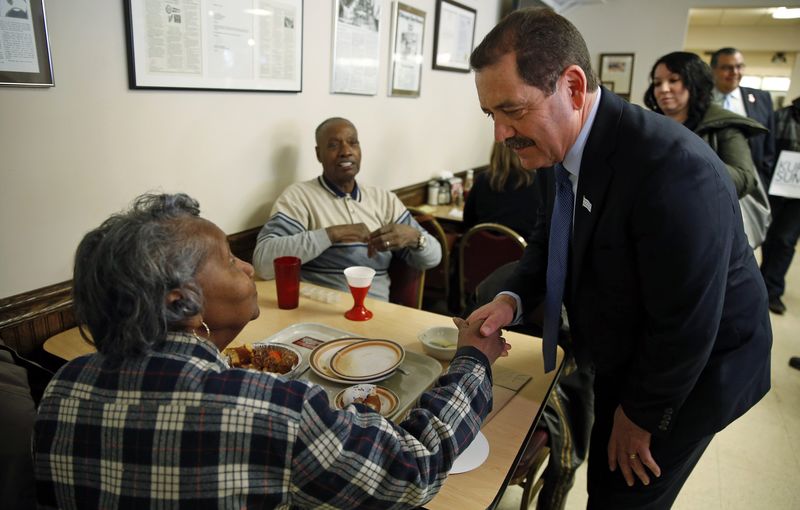By Fiona Ortiz
CHICAGO (Reuters) - Chicago mayoral candidate Jesus "Chuy" Garcia is struggling to round up support from labor unions as he seeks to unseat pro-business Mayor Rahm Emanuel, even though he bills himself as more progressive.
Garcia's surprisingly strong showing in a first round of voting on Feb. 24 prompted some big unions to see him as a viable challenger to the well-funded Emanuel and to rethink their neutral stance in the race for mayor of the country's financially troubled No. 3 city.
But interviews this week with leaders at major unions that have made no endorsement indicate none is likely to join the Chicago Teachers Union, the only major union to back Garcia before the primary.
The American Federation of State, County and Municipal Employees, or AFSCME, has decided to remain neutral in the April 7 runoff election, while a raucous disagreement over the mayor's race between two large locals of the Service Employees International Union, or SEIU, may also end in a non-endorsement.
The Chicago mayor contest pits President Barack Obama's former chief of staff against a low-profile county commissioner. The campaign also reflects divisions between big-money Democrats such as Emanuel and grassroots progressives like Garcia, each offering competing visions for how to deal with huge budget deficits.
Despite being heavily outspent, Garcia started looking like a real challenger after he took a better-than-expected 34 percent of votes in the first round. Emanuel needed more than 50 percent of votes to avoid a second-round, but got 46 percent.
Union membership is down nationally, but organized labor holds significant political sway in Chicago, where city workers must live within city limits. All told, Emanuel has backing from 70 unions, many in the construction trades.
To beat him, Garcia will need to wrest some union endorsements - and the canvassing volunteers and millions of dollars in potential contributions that come with them.
Garcia has raised only about $1.5 million, mostly from SEIU Healthcare and from the Chicago Teachers Union. The teachers clashed with Emanuel over school closures and briefly struck early in Emanuel's first term over retirement benefits.
Last year, SEIU took a statewide stance against a mayoral endorsement. When Chicago's SEIU Local 1 decided to reconsider neutrality after Garcia became a viable contender, it ran into bitter opposition from the other main SEIU group, Local 73, which represents more than 14,000 Chicago city workers.
Matt Brandon, secretary treasurer of Local 73, predicted an ugly battle between the two locals, but after talks late on Tuesday said he thought the neutral stance would prevail.
"He's been one of the best mayors we've had for working people in the city of Chicago. He created new positions and protected jobs," Brandon said of Emanuel.
Brandon has filed a complaint with SEIU International against SEIU Healthcare, the third arm of the union in Illinois. The health group defied the statewide SEIU neutrality pact and was one of Garcia's biggest financial backers in the primary, putting $385,000 into his campaign.
"We felt he was the candidate who would more clearly address issues of working people and families in Chicago," said James Muhammad, spokesman for SEIU Healthcare.
Garcia's campaign did not respond to requests for comment on the union endorsements.

A key umbrella group, the Chicago Federation of Labor, represents half a million workers in the Chicago area and 320 small unions, and is expected to remain neutral or to back Emanuel. The United Food and Commercial Workers Union and the Illinois Nurses Association are reconsidering neutrality stances.